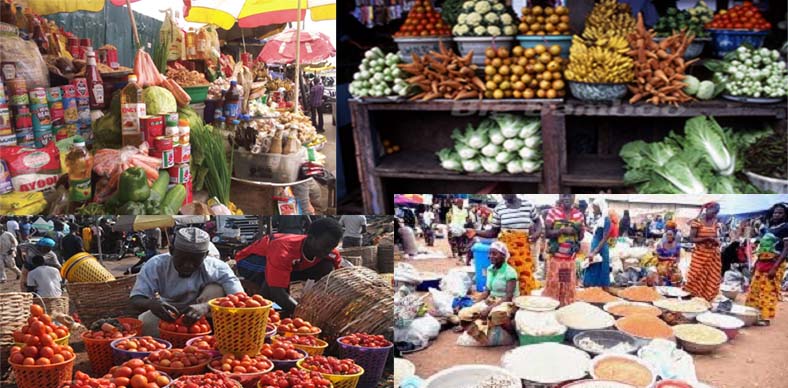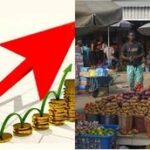High Inflation Strains Nigerian Wallets
In May 2024, Nigeria’s inflation rate surged to a 28-year high of 33.95%, driven by soaring food prices. The National Bureau of Statistics (NBS) reported that food inflation alone hit 40.66%.
This steep rise is due to the increasing costs of staples like garri, potatoes, fish, and meat. Core price growth, excluding agricultural produce and energy, also accelerated to 27% from 26.8%.
Join our WhatsApp ChannelImpact on Household Budgets
The unrelenting surge in costs is straining household budgets, affecting market stability, and altering investment landscapes across Nigeria. As a result, households are prioritising spending and skipping meals amid shrinking incomes. Analysts at Comercio Partners Research noted, “High inflation, particularly in food prices, has eroded purchasing power, negatively impacting consumer spending – a critical driver of economic growth.”
Economic Predictions
Economists predict that annual inflation will peak at 35% in the coming months, before gradually slowing to around 32% by the end of the year. They also expect the Central Bank of Nigeria’s (CBN) rate-hiking cycle to end in July. The CBN has hiked interest rates by 14.75 percentage points since May 2022, to 26.25%, to rein in inflation and defend the currency.
Public Reaction and Government Measures
Nigerians are expressing their concerns over high prices. On social media platform X, SisiYemmie tweeted, “I don’t know how people are not panicking because of this food inflation because I’m low-key panicking.” Another user, Ayin Ibibio, added, “I’m panicking. I’ve been panicking. But what can I do? I cannot generate health problems from panicking because of inflation.”
READ ALSO: Food Inflation In Nigeria Hits 40.66%, Deepening Economic Woes
The government has announced a three-month cash transfer program to provide 15 million households with 75,000 naira each to cushion the effect on citizens. In addition, President Tinubu’s administration has declared a state of emergency regarding food insecurity and unveiled an intervention plan for food security, affordability, and sustainability.
Long-Term Solutions and Expert Opinions
Experts predict that food inflation will remain high until the insecurity crisis deterring farmers from working is resolved. In February, Abubakar Kyari, minister of agriculture and food security, expressed the Federal Government’s readiness to freely distribute 42,000 metric tons of assorted grains to Nigerians in response to the rising food crisis. He added that efforts were ongoing to ramp up food production and that plans were in place to incentivize farming.
Wale Edun, the Minister of Finance and Coordinating Minister of the Economy, stated in June that food prices will begin to decline, and food availability will increase as inflation slows. “Agricultural output is up to bring down inflation. Inflation is slowing month on month. Food prices will come down; food availability will increase,” said the finance minister.
The Path Ahead
The recent surge in inflation over the last year has been attributed to Nigeria’s recent reforms from the liberalisation of the foreign exchange market to the removal of fuel and electricity subsidies. These reforms have led to a steep devaluation of the naira and increased input and transportation costs. The World Bank noted that these reforms have added to the already high cost-of-living pressures on households, impeding purchasing power.
The inflation rate accelerated for the 17th consecutive month in May. However, month-on-month headline inflation slowed to 2.14% in May 2024 from 2.29% in April 2024, marking a second broad-based decline since October 2023. Despite these measures, the recent scarcity of essentials such as tomatoes is expected to exacerbate food prices further, likely contributing to a surge in food inflation in July.
The Central Bank of Nigeria continues to hike its monetary policy rate to combat surging headline inflation. The World Bank, in its ‘Global Economic Prospects’ report, noted that there is a “possibility that the tightening of monetary policy stops short of reining in inflation.” As Nigeria navigates this economic crisis, the path ahead remains uncertain, with both short-term relief measures and long-term structural reforms needed to stabilise the economy and alleviate the burden on its citizens.
Emmanuel Ochayi is a journalist. He is a graduate of the University of Lagos, School of first choice and the nations pride. Emmanuel is keen on exploring writing angles in different areas, including Business, climate change, politics, Education, and others.
- Emmanuel Ochayihttps://www.primebusiness.africa/author/ochayi/
- Emmanuel Ochayihttps://www.primebusiness.africa/author/ochayi/
- Emmanuel Ochayihttps://www.primebusiness.africa/author/ochayi/
- Emmanuel Ochayihttps://www.primebusiness.africa/author/ochayi/



















Follow Us